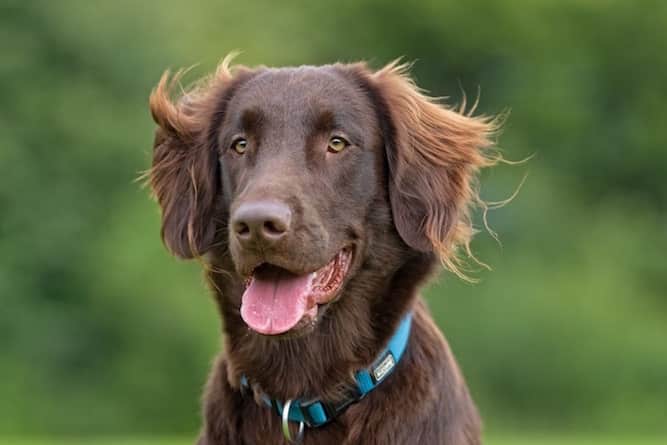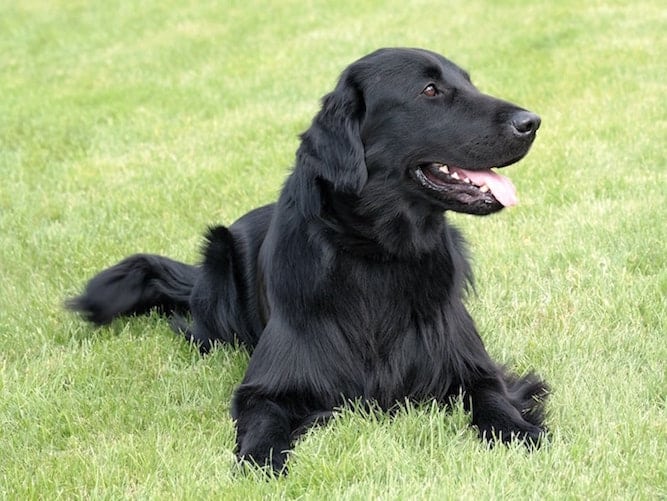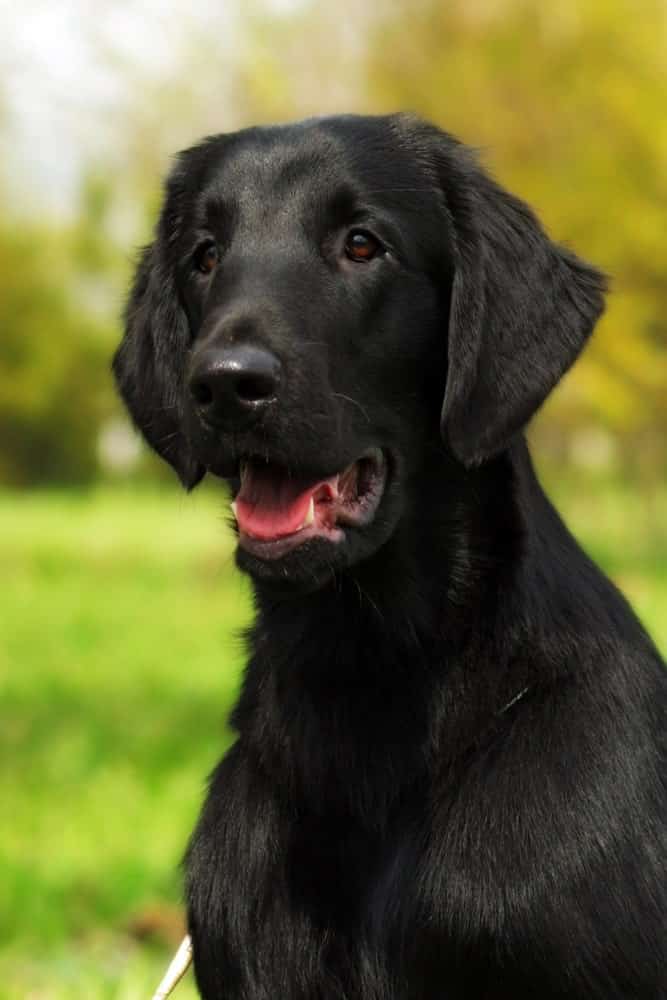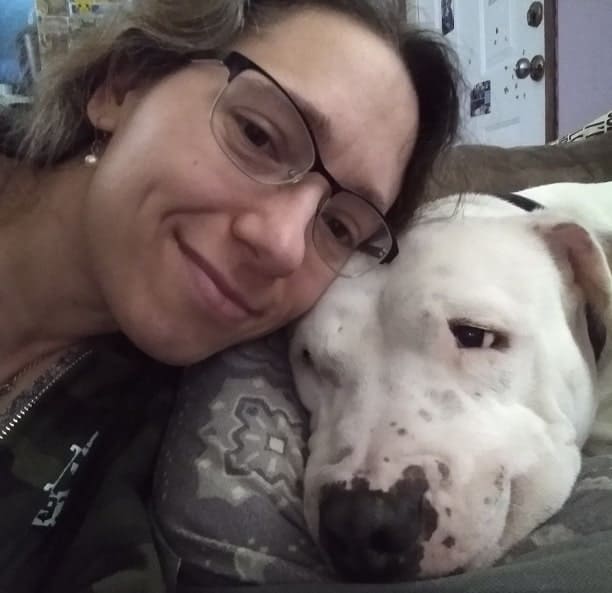The Flat-Coated Retriever temperament is playful and friendly. Their lively spirit is infectious, and their “Peter Pan” mentality keeps them young at heart far longer than other members of the dog Sporting Group. A favorite hunting dog throughout World War I, the Flat-Coated Retriever also gets along great with other pets and children.

Flat-Coated Retriever Temperament and Personality
Often referred to as the “Peter Pan” of the Retriever group, the Flat-Coated Retriever tends to mature slower than their Sporting Group counterparts.
What this means is that this is a breed that maintains their puppyhood for years.
This can sound like a lot of fun but it can become incredibly taxing pretty quickly. For instance, you may find yourself yelling, “why do you still do these things? You’re not a puppy anymore!”
So, if this sounds like something you don’t think you’ll have the patience for (and that’s okay – many people don’t), then this may not be the right breed for you.
Keep reading for some more information about the Flat-Coated Retriever temperament that will help you make a decision insofar as to whether to bring this shaggy little guy home.
They’re Playful
Flat-Coated Retrievers have playful energy that is infectious. They make loyal and entertaining family companions.
This also means that they are one of those breeds who truly don’t know their own strength.
They’ll jump up on anyone and anything in excitement, not realizing that their size can knock smaller people or senior citizens down.
You can, and should, train them out of this bad habit while they’re still young.
While it may be cute to watch a young puppy jump up on Grandma, it’s not going to be as cute when he grows up to be a lot bigger – and when Grandma is even older.
They’re Friendly
Friendly and tolerant, the Flat-Coated Retriever adores everyone – including other dogs and children.
But, because of their rambunctious nature, they could be too energetic for toddlers.
Flat-Coated Retrievers do make great companions for active older children, though.
Flat-Coated Retrievers also get along with cats – although some cats aren’t a fan of their constant attention!

They’re Alert
While they will bark to alert you someone is coming, don’t count on them to do something about it. This breed is far too sweet-natured to make a successful guard dog.
For example, the Flat-Coated Retriever will often greet a guest with something in their mouth – a toy, rawhide, shoe, etc.
Or, they are bouncing up and down to show their excitement at making a potential new friend.
They’re Not Suited for Apartment Living
Though they are quite calm indoors, they are still not suited for apartment life.
Because of their hunting history, the Flat-Coated Retriever will enjoy a house with a backyard.
They will also do well in a home that will utilize their talents: swimming and running.
They Love Companionship
The Flat-Coated Retriever loves to be around their humans and doesn’t like it when you leave them alone.
They are attention hogs and if left alone for too long, they can become destructive as a way to deal with all their pent-up energy.
They Have an Oral Fixation
Like other Retriever breeds, Wavy-Coated Retrievers are “chewers”.
This means they love to put things in their mouths.
Sometimes they won’t realize they’re destroying something, like your favorite shoes. Other times, they’re simply nibbling on your hands just to have something in their mouths.
To combat this, try keeping a box of their favorite toys around and within reach.
This way, when they start chewing on something they shouldn’t be, you can quickly substitute a toy in place of your hand or favorite pair of shoes.
Watch Your Food Around Them!
Flat-Coats are, simply put, food thieves. Be careful with any food you leave on counters or within reach, as they will make it their life’s mission to find a way to get to it.
And speaking of food, this is gross, but you still need to know it: some Flat-Coated Retrievers may eat their own poop. This is called Coprophagia.
So, when you’re out for a walk, make sure you bring plenty of poop bags with you so you can scoop up their poop before they get a chance to snack on it.
They Need Guidance
The Flat-Coated Retriever is not as easygoing as their Golden Retriever cousins. And this breed will certainly let you know that during training sessions.
This is a willful breed. They are willing to learn from and obey their masters but you must teach them good manners. It’s just not something that comes naturally for them.
The Flat-Coated Retriever Appearance

Size
If you’re concerned about their size, a healthy weight for this breed is between 60 and 70 lbs..
Also, their average height is between 22 and 24.5 inches tall when full-grown
Colors
The Flat-Coated Retriever colors come in sleek black, yellow, or liver, with feathering at the tail and legs. They have dark brown or hazel eyes.
A Brief History of the Flat-Coated Retriever
Though they were popular until the end of World War I, the popularity of the Labrador and Golden Retriever significantly overshadowed that of the Flat-Coated Retriever, to the point where they were in danger of becoming extinct several times.
Luckily for all of us, a dedicated group of Flat-Coated Retriever enthusiasts brought the breed back during the mid-1960s.
Today, the Flat-Coated Retriever is still a rare breed. But, thanks to their fan club whose interest and efforts help to preserve the breed, we can continue to enjoy their intelligence, natural working ability, and demeanor.
Breeders initially developed Flat-Coated Retrievers as “dual-purpose Retrievers,” meaning they were able to retrieve game both on land and in water.
How Do You Train a Flat-Coated Retriever?
The Flat-Coat Retriever is both very intelligent and sensitive. Keep things two things in mind as you train your puppy.
Start Flat-Coated Retriever training early, as they remain puppylike far longer than other breeds do.
They are very food-motivated, but they will also accept toys as rewards. In fact, though they like praise, Flat-Coats would actually prefer treats and toys as their rewards.
Positive reinforcement works best with this breed. Because Flat-Coats are sensitive, they don’t respond at all to harsh training. They simply shut down and stop trying – and then you’ve lost the battle.
Keep training sessions fun and short, and you’ll have a well-trained Flat-Coated Retriever in no time.
Helpful Dog Training Resource:
For help with training your dog, you should take a look at The Online Dog Trainer by Doggy Dan. Doggy Dan is an expert Dog Trainer based in New Zealand. His online resource contains Hundreds of Excellent Dog Training Videos that will take you step-by-step through the process of developing a healthy, happy well-behaved dog.
How Do You Groom a Flat-Coated Retriever?
Because of their floppy ears, you should check the Flat-coated Retriever's ears regularly and clean them if necessary.
If not, you risk them developing ear infections from excess moisture in their ears.
Trim their nails often, too, to avoid any ingrown nails which can make walking uncomfortable.
Follow These 10 Steps for Outstanding Grooming Results.
Do Flat-Coated Retrievers shed?
The answer is yes – and a significant amount, too.
The moderately long coat of the Flat-Coated Retriever requires weekly brushing with a metal dog comb.
This helps removes loose hair and dirt to keep their appearance in tip-top shape.
Are Flat-Coated Retrievers Hypoallergenic?
Nope. These dogs are definitely not hypoallergenic.
If in the past you haven’t been able to spend time with dog because you develop an allergic reaction to them, then you shouldn't take a Flat-Coated Retriever for a pet.
You are almost guaranteed to suffer an allergic reaction around this breed.
Flat-Coated Retriever Health Issues
Though regarded as a healthy breed, the Flat-Coated Retriever is, like any other breed, prone to certain health conditions. In fact, while they don’t come down with as many conditions as other breeds, for some reason they are particularly sensitive to a wide variety of cancers.
Some maladies to watch out for with this breed include:
- Hip Dysplasia, a common hip condition, no matter the breed
- Patellar Luxation, a common knee condition
- Cancer, including lymphosarcoma(attacks the lymphatic system), osteosarcoma (bone cancer), malignant histiocytosis (cancer that affects the white blood cells) and liver hemangiosarcoma.
Helpful Dog Health Resource:
Flat-Coated Retriever Lifespan
The Flat-Coated Retriever life expectancy is between 8 to 10 years. This is a normal average lifespan for a dog of this size.
Exercise
One of the most active breeds in the Sporting Group of dogs, the Wavy-Coated Retriever requires a lot of daily activity. In fact, experts recommend a minimum of 90 minutes of activity every day. This is a breed that loves to run, retrieve, and swim.
If you have access to a pool or pond, the Flat-Coated Retriever will instantly be your best friend.
Swimming is easily one of their favorite activities. Don’t be surprised if you find your Flat-Coat laying in a puddle or running headfirst into the pool.
If you don’t have access to a pool, regular runs or long walks will work for the Flat-Coated Retriever, along with games of fetch in the backyard.
Due to their retrieving background, Flat-Coated Retrievers do well with organized dog sports such as agility, hunt tests, obedience, flyball, or tracking.
Finding the Perfect Flat-Coated Retriever
Buying the perfect Flat-Coated Retriever doesn’t have to be overwhelming.
Once you decide whether you’d like a Flat-Coated Retriever from a breeder or rescue, it’s time to do your research.
Your first stop should be the Flat-Coated Retriever Society of America.
Here, you’ll find everything you need to know about the Flat-Coated Retriever breed. They also have information about Flat-Coated Retriever rescues.
Flat-Coated Retriever Puppies for Sale
At this point, you may be wondering, how much does a Flat-Coated Retriever cost?
Well, Flat-Coated Retriever puppies for sale will cost between $1,000 and $1,200.
The high cost is in part because the breed is still relatively rare, you may have limited breeder and rescue options.
Flat-Coated Retriever Rescue and Adoption
The Flat-Coated Retriever Club (another name for the Flat-Coated Retriever Society of America) has a rescue group, too. They have a section with Flat-Coated Retrievers available for adoption.
If you are looking for a Flat-Coated Retriever mix, rescue is your best bet.
Most rescues or local animal shelters will only have Flat-Coated Retriever mixes available for adoption; this is due to the rarity of the breed.
Flat-Coated Retriever Breeders
Finding a reputable Flat-Coated breeder doesn’t have to be a headache.
Search local breeders and schedule home visits to see how they treat their dogs and puppies. A great breeder to have clean indoor kennels.
Flat-Coated Retriever breeders should know the ins and outs of the breed – including any health or temperament concerns.
Flat-Coated Retrievers puppies from a breeder should come with health certificates and be properly socialized.
Steer clear of any breeder that can’t provide health certificates. And, avoid breeders who cannot answer your questions about the breed.
7 Other Breeds with Similar Characteristics
So you came up empty-handed in your search for a Flat-Coated Retriever!
You are tired of looking. And you can't wait any longer
Well, have no fear. You have many other breed options.
These other Sporting Dog breeds have similar temperament traits as the Flat-Coat.
You may also find them to be equally attractive:
- Boykin Spaniel Temperament
- Brittany Spaniel Temperament
- Chesapeake Bay Retriever Temperament
- English Cocker Spaniel Temperament
- German Shorthaired Pointer Temperament
- Nova Scotia Duck Tolling Retriever Temperament
- Wirehaired Pointing Griffon Temperament

Flat-Coated Retriever Mixed Breeds
If you’re interested in a Flat-Coated Retriever mix, here are two to consider:
- Aussie-Flat is an Australian Shepherd mixed with the Flat Coat
- Chatham Hill Retriever is a blend between the Flat-Coated Retriever and a Cocker Spaniel.
You might also be interested in the Corgi-Flat, which is a combination of a Flat-Coated Retriever and a Welsh Corgi.
Flat-Coated Retriever vs. Golden Retriever
When you think “Retriever,” you probably think of either the family favorite Golden Retriever or the ever-so-common Labrador Retriever.
What, then, you may think, makes a Flat-Coated Retriever different from, say, their Golden Retriever cousins?
Well, for one thing, the Flat-Coated Retriever, while still a great family dog, is more of a confident and outgoing little brother of a dog. The Golden Retriever, on the other hand, is more the reliable, trustworthy old man companion.
They’re both highly playful and easy to train. However, the Golden Retriever needs a significantly higher amount of social interaction than does the Flat-Coated Retriever.
This means you’ll be spending way more time at the dog park with the Golden than with the Flat-Coat.
Flat-Coated Retriever vs. Labrador Retriever
Now that we’ve compared the temperaments of the Flat-Coated Retriever and his Golden cousin, let’s take a look at some of the differences between the Flat-Coat and the Labrador Retriever.
Both breeds are easy to train, but the Flat-Coat is more likely to experience distractions than the Labrador.
Labs are therefore chosen more often for more serious jobs like guide dogs and therapy dogs. Both breeds, however, are cheery, intelligent dogs with high energy levels and exquisite athletic ability.
Something that may be a deal-breaker for you, though, is that, while both breeds are good for first-time dog owners, the Labrador has a slight edge over the Flat-Coat in that regard.
A Final Word about the Flat-Coated Retriever Temperament
With their friendly and playful nature, the Flat-Coated Retriever temperament makes them an excellent family pet.
However, they can remain mischievous for far longer than other breeds due to maintaining their puppy-like behavior into early adulthood.
Keep an eye on your food in particular, as this breed is a regular Houdini when there’s people food around.
If you’re looking for a companion animal that will also excel at dog sports, the Flat-Coated Retriever is for you.

Kailyn has worked as a professional freelance writer since 2012, and during that time she has written about nearly every dog breed imaginable. Her mother loved Collies, and so Kailyn grew up with three of them throughout her childhood – including a blonde one who was half-blind! Now her home belongs to her first official dog, Macho, a Dogo Argentino rescue.